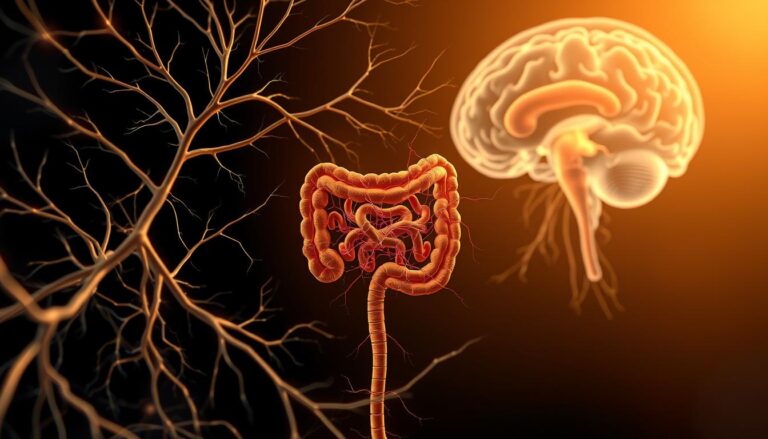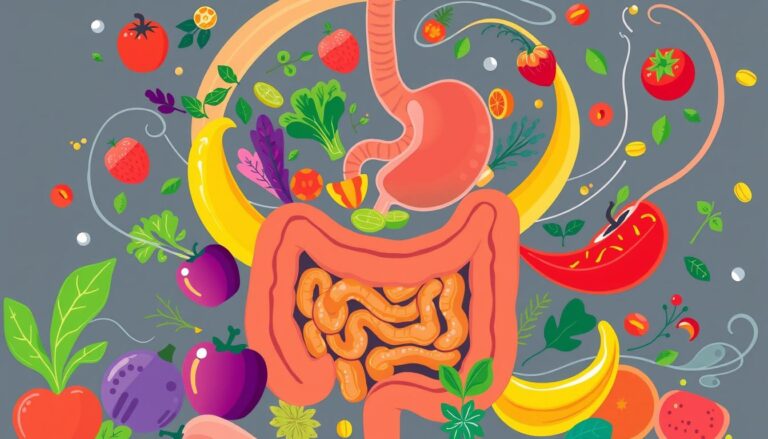Are you confused by the different advice about fats? It’s true, not all fats are the same. Some fats are good for your heart brain and health overall. We’ll look into what these healthy fats are.
And where you can find them. Get ready to change how you think about the truth about healthy fats.
Key Takeaways
- Healthy fats such as monounsaturated and polyunsaturated fats can do a lot of good. They lower bad cholesterol and help your heart. They also keep your blood sugar level and fight inflammation.
- The top sources of healthy fats come from plants. Think avocados olive oil nuts, seeds, and fatty fish.
- Polyunsaturated fats have cool benefits, like omega-3s in salmon and walnuts. They keep your brain sharp skin healthy, and help burn fat.
- It’s important to swap out unhealthy fats for healthier ones. This change can improve your well-being.
- Always check food labels. It’s the best way to avoid bad trans fats that hide in some foods.
What Are Healthy Fats?
There are mainly two kinds of dietary fats: saturated and unsaturated fats. Saturated fats are solid at room temperature and are often in meats and dairy. On the flip side unsaturated fats found in vegetable oils nuts and fish are liquid at room temperature.
Types of Dietary Fats
Unsaturated fats have two categories: monounsaturated and polyunsaturated. Foods like avocados olive oil, and peanuts offer monounsaturated fats. And polyunsaturated fats, which contain omega-3 and omega-6 are in walnuts flax seeds, and fatty fish.
Role of Fats in the Body
Fats help the body use vitamins and shape our cells’ structure and function. Saturated fats may increase heart disease risk. In contrast unsaturated fats have health benefits such as better cholesterol and support for brain and skin health.

Benefits of Healthy Fats
Research shows that including good fats in our meals has many upsides. They lower heart disease risk and make our blood cholesterol better. Healthy fats also help keep our blood sugar and body’s inflammation levels in check.
They’re good for our blood pressure and support our stomach’s health. Getting enough of these fats helps keep our gut lining healthy. This lining is vital for our body’s digestion, absorbing nutrients, and immune system.
Lowering Bad Cholesterol Levels
Unsaturated fats, like polyunsaturated fats PUFAs and monounsaturated fats MUFAs are good for us. They cut down bad cholesterol LDL and raise good cholesterol HDL. This helps lower our heart disease risk. Certain saturated fats do good too. By eating them in moderation we can boost our HDL and lower our total cholesterol.
Improving Heart Health
Healthy fats have a big part in preventing heart disease. Studies show eating fatty fish twice a week can decrease the risk in high risk folks. Having a diet that balances fat types is key. Healthy fats do a lot for our body. They give us energy make hormones, help us absorb nutrients, and protect our organs.
Regulating Blood Sugar
Unsaturated fats can also help with managing blood sugar. Swapping saturated fats with unsaturated ones might make our bodies better at controlling blood sugar. This could lower risks of insulin problems and type 2 diabetes.
Reducing Inflammation
Omega-3 fats are famous for fighting inflammation. Adding more of these fats to our meals might lessen inflammation in our bodies. Less inflammation can reduce our chances of various chronic illnesses.
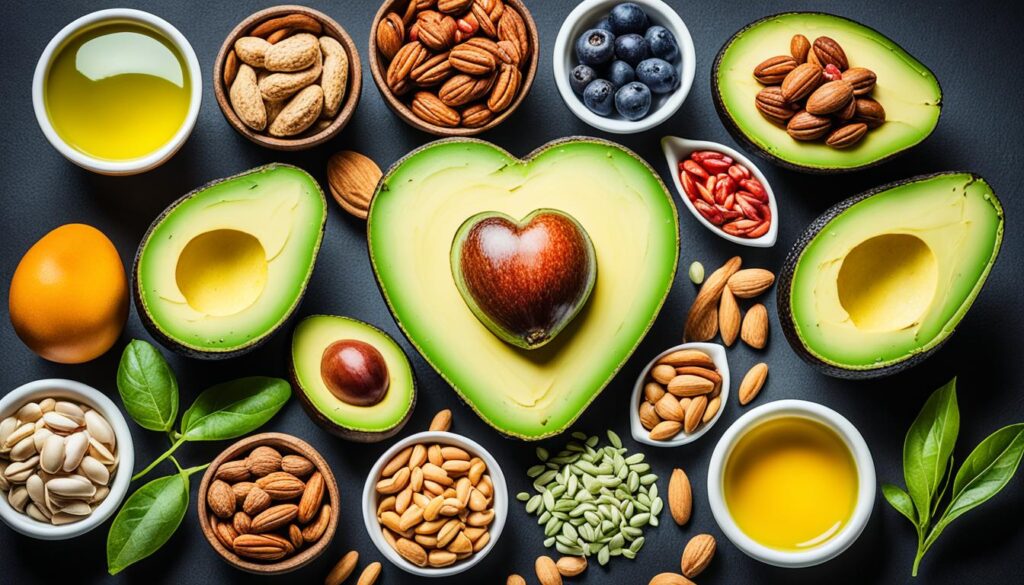
Read more: Inflammation Relief with Nitric Oxide Creams
Monounsaturated Fats
Monounsaturated fats come from foods like red meats and dairy. Half the fats in these foods are monounsaturated. Many plants are also rich in this healthy fat.
Oils from olives, peanuts, and seeds like canola are good sources. So are avocados pumpkin seeds, and various nuts. They are low in bad fats and good for you.
Sources of Monounsaturated Fats
Monounsaturated fats are in foods that are good for you. Olive oil, avocados, and nuts are some great sources. They are a big part of the Mediterranean diet, known for its health benefits.
Benefits of Monounsaturated Fats
Plants’ monounsaturated fats can boost heart health. They lower bad cholesterol and help maintain blood sugar. Replacing bad fats with these can cut heart disease and diabetes risks.

Polyunsaturated Fats
Polyunsaturated fats come in two types: omega-6 fatty acids and omega-3 fatty acids. Foods rich in omega-6 are corn, peanut, and sunflower oils. Eating these instead of saturated fats could help lower bad cholesterol and improve blood sugar.
In contrast, omega-3 fatty acids are found in oily fish and some plant oils. For example, salmon, tuna, and oils from flaxseeds and walnuts are great sources. A diet high in omega-3 can reduce heart disease risk by lowering blood triglycerides.
| Fish | Omega-3 Content grams in 3 oz/85g |
|---|---|
| Salmon | 1.8 |
| Herring | 1.7 |
| Sardines | 1.2 |
| Mackerel | 1.0 |
| Trout | 0.8 |
| Bass | 0.7 |
| Shrimp | 0.2 |
The top plant-based oils for polyunsaturated fats are safflower grapeseed, and flaxseed oils. These oils are over 60% polyunsaturated fats.
Studies in the 1960s and ’70s observed a decreased risk of dying from heart disease in populations that consumed fish.
Despite the good news about omega-3s not all studies agree they help heart health. For example, a look at 78,000 people found no benefit from omega-3 supplements. It’s important not to have too much omega-6 as it could lead to body inflammation.
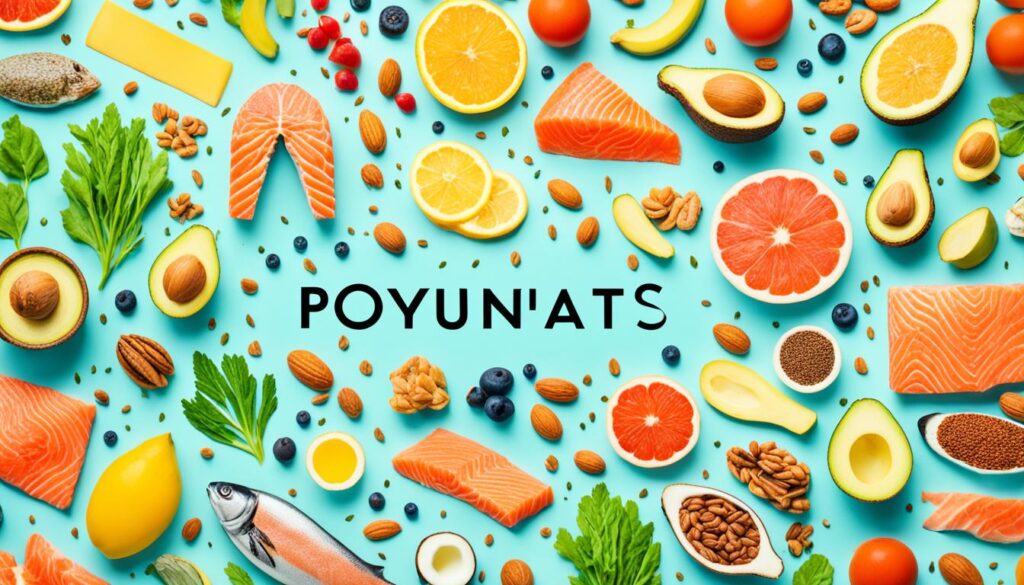
Read more: Benefits of Taking Olive Oil Daily Health Perks
Healthy Fats
Healthy fats bring important health benefits. This includes lowering bad cholesterol and improving heart health. Monounsaturated fats and polyunsaturated fats along with omega-3 fatty acids are key. You can find these healthy fats in avocados olive oil nuts seeds and fatty fish.
Monounsaturated and polyunsaturated fats are known as the good fats. They lower the risk of heart disease and stroke. Limit saturated fats to no more than 10% of daily calories. This is about 10 to 15 grams per day for most adults. The American Heart Association recommends 1 gram of EPA plus DHA primary omega-3 fatty acids per day for those with heart disease.
Having at least two 3.5 oz. servings of fatty fish each week is good. Salmon mackerel herring, and sardines are great choices. They offer important omega-3s with health benefits for your brain and more.
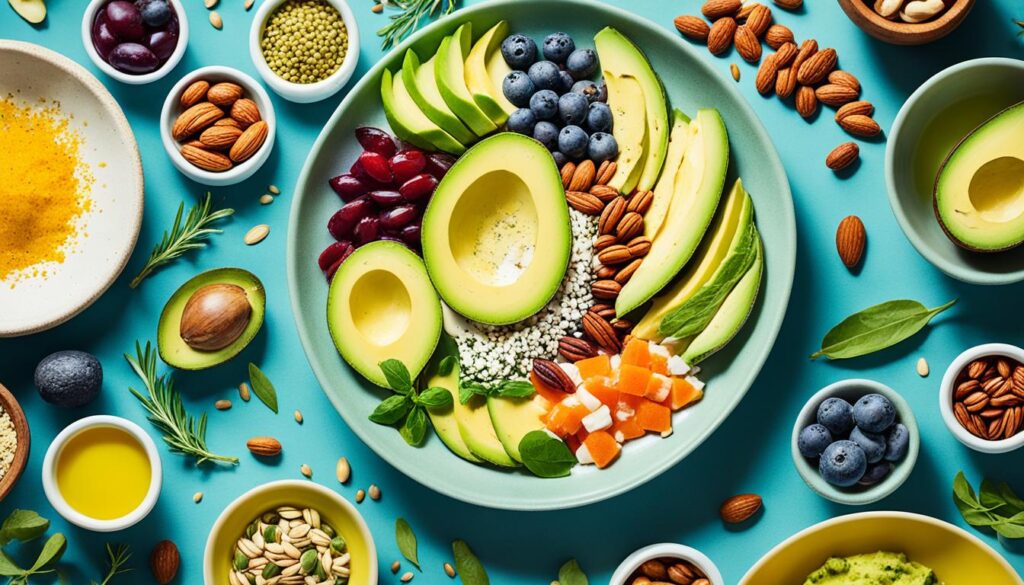
Yet, almost all fish have some pollutants like mercury. Pregnant women, nursing mothers, and children under 12 should avoid high mercury fish. Most adults can eat up to 12 oz. of cooked fish per week. Stay away from high mercury fish such as shark, swordfish, tilefish, and king mackerel.
Adding more healthy fats to your diet makes a big difference. Simple changes like using olive oil and eating more avocados can help. These fats are good for your heart brain, and metabolism. Enjoy these foods to boost your health.
Unhealthy Fats to Avoid
It’s great to enjoy healthy unsaturated fats. But, beware of trans fats and saturated fats. They can harm your heart and cholesterol.
Trans Fats
Trans fats are made by changing plant oils. They’re very bad for your health. They can make your heart disease risk higher. They also lower the good cholesterol that your body needs. Because of this, the U.S. Food and Drug Administration has stopped food makers from using these fats.
Saturated Fats
Animal products like meat and dairy contain saturated fats. While not as bad as trans fats, they still aren’t great. Eating too much saturated fat can raise your bad cholesterol. This means you might have a bigger chance of getting heart problems. Health experts say you should eat less than 10% of your daily calories from these fats.
| Unhealthy Fat | Maximum Recommended Intake |
|---|---|
| Trans Fats | Less than 1% of total daily calories |
| Saturated Fats | Less than 7% of total daily calories |
Know the good fats from the bad to help your heart and health. Try to use healthy unsaturated fats more. This is a good way to eat better.
Incorporating Healthy Fats into Your Diet
To include more healthy fats in what you eat, aim for a mix of plant-based sources. Think about using olive oil avocados nuts, and seeds. Olive oil is great for monounsaturated fats and you can cook with it or use it in salads.
Eat fatty fish like salmon, mackerel, and sardines for omega-3 fatty acids twice weekly. Nuts and seeds such as walnuts flaxseeds, and chia seeds are packed with polyunsaturated fats and other key nutrients. Adding these to your meals and snacks can benefit your heart mind, and health overall.
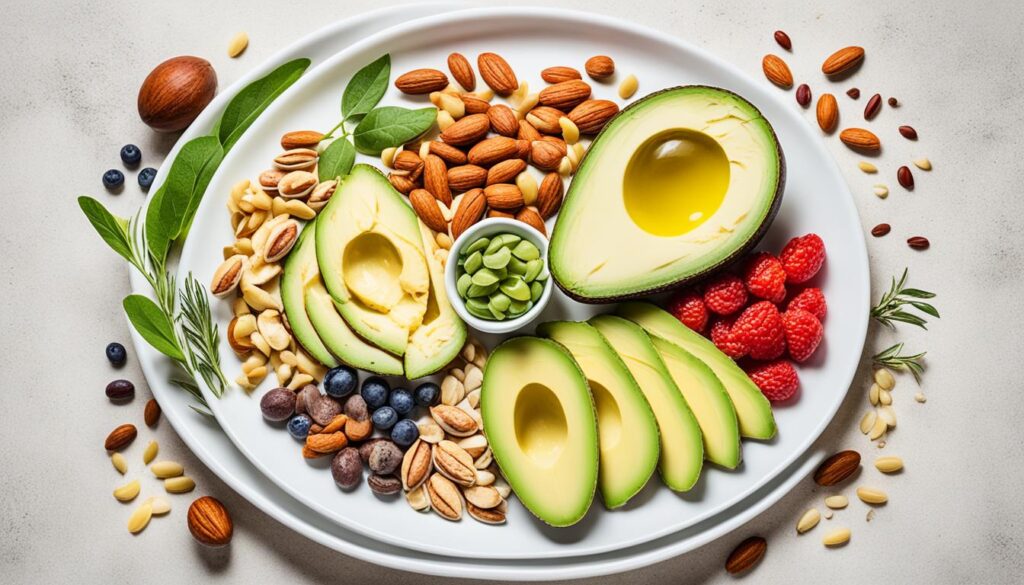
Plant-Based Sources
Adding a mix of plant-based sources to your diet, such as olive oil, avocados, nuts and seeds, brings many nutritional rewards. For instance olive oil is a fine source of monounsaturated fats. It’s good for cooking, baking, and salads.
Avocados boost your healthy fat intake while offering fiber vitamins, and minerals. Nuts and seeds, including chia flax, and sunflower are full of polyunsaturated fats and vital nutrients.
Fatty Fish
Eating fatty fish like salmon mackerel sardines, and tuna is an excellent way to get more omega-3 fatty acids. The American Heart Association suggests eating two servings of fish each week about 3.5 oz. 100 g each. Omega-3s benefit your brain heart, and help lessen body inflammation.
Nuts and Seeds
Nuts and seeds offer a lot of healthy fats, like polyunsaturated and monounsaturated fats. Choices such as walnuts flaxseeds chia seeds, and hemp seeds are high in omega-3s. A quick good way to get more of these healthy fats is to add nuts or nut butter to your meals or snacks.
Omega-3 Fatty Acids The Superstar of Healthy Fats
Omega-3 fatty acids are known as polyunsaturated fat. They are very good for us. Research proves they can fight depression, ADHD, and bipolar disorder. They also guard against memory loss and dementia. Plus, they lower heart disease, stroke, and cancer risks. They make arthritis and skin conditions better too.
Benefits of Omega-3s
Adding omega-3 fatty acids to your diet has big benefits. They help the brain and mood. They fight inflammation and make the heart healthier. Including more omega-3s in what you eat can really change your health for the better.
Food Sources of Omega-3s
Fatty fish like salmon, mackerel, sardines, and trout are rich in omega-3 fatty acids. So are flaxseeds chia seeds, and walnuts. If you’re not into fish omega-3 supplements are a good choice. Just make sure you pick a quality one. It should have the right amounts of EPA and DHA.
Supplementation
While eating a balanced diet is best for getting omega-3 fatty acids, sometimes we need more. Omega-3 supplements can help fill in the gaps. Choose a supplement that has the right balance of EPA and DHA. This will ensure you get the most out of them.
Balancing Healthy and Unhealthy Fats
The key to a good fat intake is not a very low-fat diet. Replace trans fats and saturated fats with unsaturated ones. You’ll improve your heart brain, and metabolic health a lot by making this change.
Replacing Bad Fats with Good Fats
Use plant-based oils like olive, avocado or nut oils when you cook. This is better than using butter or lard. Also, pick lean meats and skinless poultry. Eating more fatty fish, nuts, seeds, and avocados helps a lot too.
Reading Food Labels
When you shop, look at food labels closely. Watch for hidden trans fats often called partially hydrogenated oils. Even if food says trans fat-free it can still have this harmful fat. Making these changes will help your health overall.
Myths and Misconceptions About Healthy Fats
For years, experts cautioned against saturated fats due to heart risks. Yet, new research challenges this. It suggests that eating saturated fats doesn’t always mean more heart problems. Other factors like age, environment, and genetics affect this too.
The focus now is on swapping unhealthy fats for unsaturated fats. This is better than cutting all fats. Using plant-based oils instead of animal fats can reduce cholesterol and heart risks. But, using refined carbohydrates does not offer the same health benefits.
| Myth | Fact |
|---|---|
| All saturated fats are bad for you. | Saturated fats, in moderation, fit well in a healthy diet. Some, like those in coconut oil, can be good for you. |
| Low fat and no fat diets are always healthier. | Eating too little fat can mean missing out on key nutrients. It’s better to focus on the quality of fats and overall diet. |
| Eating fat will make you gain weight. | Extra calories from carbs and protein can turn into body fat too. A diet with moderate to high amounts of fat might lead to weight loss just like a low fat diet. |
It is important to learn about healthy fats. By knowing their benefits, we can make smarter food choices. This helps dispel myths and misconceptions about healthy fats and lead healthier lives.
Conclusion
As we end our journey through the world of healthy fats, it’s clear these ingredients are heroes. They bring heart health brain benefits, and more. By adding them to our diet we find a well of wellness beyond our bodies.
Healthy fats have wrongly been feared. But now, let’s celebrate them. With some smart choices like adding salmon olive oil to salads or enjoying avocado toast, we make these foods a kitchen staple. Getting healthy and staying fit has never tasted better.
As we wrap this up, remember the healthy fats in our diet. They support us in body brain, and spirit. Enjoy adding them to your favorite dishes. The journey to being well is full of flavor.


